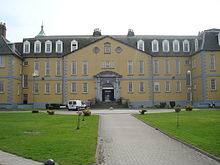Grizell Steevens
Grizel Steevens | |
|---|---|
 Dr. Steevens' Hospital in 1800 | |
| Born | 1653 England |
| Died | 1746 |
| Nationality | United Kingdom |
Griselda Steevens (also known as Grizel Steevens or Grizell Steevens) (1653 – 18 March 1746) was the creator and part-benefactor of Dr Steevens' Hospital in Dublin. For a time it was commonly known as "Madame Steevens' Hospital". Due to her shyness and her habit of wearing a veil there was a baseless rumour that she had the face of a pig. It is unclear when this rumour started.
Life
Steevens was born in 1653 in England. She was the twin sister of Dr Richard Steevens (1653–1710), a Dublin physician.[1] As a youth Griselda had suffered a disorder of the eyes, and since then had worn a veil while in sunlight.
Her twin died in 1710, leaving lands in Westmeath and what is now County Offaly. These yielded an income of £606 (about £100,000 as of 2024) per year to Griselda.[2][3] A clause in her brother's will stipulated that on Griselda's death, the income was to be used to provide a hospital for the poor of Dublin.[2]

Griselda Steevens decided that she would begin work on the hospital in 1720.[2] Reserving only £120 per year for her own use, she used the remaining funds to buy a plot of land near Kilmainham and to build the new hospital, with the sole condition being that she be granted a suite of apartments in the building.
Steevens was shy and reclusive. While conducting her charitable works in the Dublin slums she would remain in her carriage while servants gave out alms to the poor.[4] By 1723 a sufficient portion of the new Dr Steevens' Hospital was completed to accommodate 40 patients, in addition to Griselda's apartments.[5] The remainder of the hospital, with space for 200 patients,[5] opened in 1733. The new hospital was known, erroneously, as "Madame Steeven's Hospital".[2][6]
According to some accounts and dismayed by the belief that she had a pig's head, Griselda took to sitting on an open balcony to allow the public to see her face.[4] Although others believe that the rumours did not circulate until after her death.[7]
Bondeson says that she commissioned a portrait of herself to be hung in the main hall of the hospital, and that there was a portrait in a pub that showed Steevens with a pig's head.[8] Steevens withdrew from public view completely before her death on 18 March 1746.[2][8] Griselda lived in the hospital from 1723 until her death.[2]
Rumour
It is unclear when the pig's face rumour arose. Robert Chambers and Irish Georgian Society founder Desmond Guinness claim that the rumour was current in her lifetime,[9][10] but Thomas Kirkpatrick, author of History of Dr Steevens' Hospital Dublin, says that "There is absolutely no evidence of this story in contemporary records, nor indeed does it appear to have been connected with the good lady until the nineteenth century [...] It is not quite certain when this story first gained circulation. Croker-King, who wrote a history of the hospital in 1785, makes no mention of it, nor is there any suggestion of it in the newspaper accounts of the death of Madam Steevens, or the published account of the hospital in the eighteenth century."[7]
The rumour was that Griselda Steevens' was veiled owing to her having been born with a pig's head.[4] Chambers (1864) speculates that her unusual name and the common belief that she was named "Grisly" on account of her appearance.[11]
Surgeon and historian William Wilde recollected that as a medical student at Dr Steevens' Hospital in 1832 he was shown a silver trough, alleged to have belonged to Griselda Steevens.[8]
References and sources
Notes
- ^ Bondeson 2006, p. 81.
- ^ a b c d e f Townsend 1860, p. 17.
- ^ UK Retail Price Index inflation figures are based on data from Clark, Gregory (2017). "The Annual RPI and Average Earnings for Britain, 1209 to Present (New Series)". MeasuringWorth. Retrieved 7 May 2024.
- ^ a b c Bondeson 2006, p. 82.
- ^ a b Chambers 1850, p. 107.
- ^ Craig, Maurice (2006) [1952]. Dublin 1660–1860. pp. 122–124. ISBN 1-905483-11-2.
- ^ a b Ó Súilleabháin 1971, p. 253.
- ^ a b c Bondeson 2006, p. 83.
- ^ Chambers 1850, p. 106.
- ^ Guinness 1967, p. 32.
- ^ Chambers 1864, p. 257.
Sources
- Bondeson, Jan (2006). The Pig-Faced Lady of Manchester Square & Other Medical Marvels. Stroud: Tempus Publishing. ISBN 0-7524-3662-7.
{{cite book}}: Invalid|ref=harv(help) - Chambers, Robert (17 August 1850). "'Modern Myths'—The Pig-Faced Lady". Chambers's Edinburgh Journal (346). Edinburgh: William Chambers.
{{cite journal}}: Invalid|ref=harv(help) - Chambers, Robert (1864). The Book of Days. Vol. 2. London: W. & R. Chambers.
{{cite book}}: Invalid|ref=harv(help) - Guinness, Desmond (1967). Portrait of Dublin. London: Batsford. OCLC 460565214.
{{cite book}}: Invalid|ref=harv(help) - Ó Súilleabháin, Seán (1971). "Díoltas i nDroch-Bhirt". Béaloideas (in Irish). 39. Dublin: An Cumann Le Béaloideas Éireann/The Folklore of Ireland Society. JSTOR 20521359.
{{cite journal}}: Invalid|ref=harv(help) - Townsend, Horatio (1860). The History of Mercer's Charitable Hospital in Dublin. Dublin: George Herbert.
{{cite book}}: Invalid|ref=harv(help)
